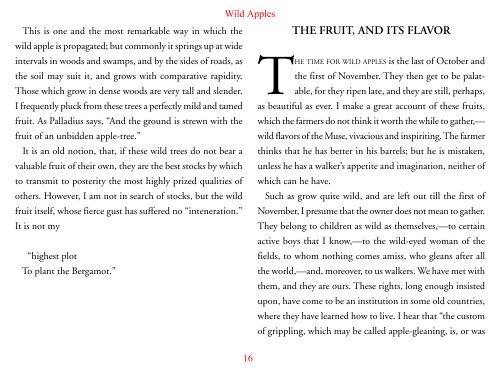Wild Apples - Penn State University
Wild Apples - Penn State University
Wild Apples - Penn State University
You also want an ePaper? Increase the reach of your titles
YUMPU automatically turns print PDFs into web optimized ePapers that Google loves.
<strong>Wild</strong> <strong>Apples</strong><br />
This is one and the most remarkable way in which the<br />
wild apple is propagated; but commonly it springs up at wide<br />
THE FRUIT, AND ITS FLAVOR<br />
intervals in woods and swamps, and by the sides of roads, as<br />
the soil may suit it, and grows with comparative rapidity.<br />
Those which grow in dense woods are very tall and slender.<br />
THE TIME FOR WILD APPLES is the last of October and<br />
the first of November. They then get to be palatable,<br />
for they ripen late, and they are still, perhaps,<br />
I frequently pluck from these trees a perfectly mild and tamed as beautiful as ever. I make a great account of these fruits,<br />
fruit. As Palladius says, “And the ground is strewn with the which the farmers do not think it worth the while to gather,—<br />
fruit of an unbidden apple-tree.”<br />
wild flavors of the Muse, vivacious and inspiriting. The farmer<br />
It is an old notion, that, if these wild trees do not bear a thinks that he has better in his barrels; but he is mistaken,<br />
valuable fruit of their own, they are the best stocks by which unless he has a walker’s appetite and imagination, neither of<br />
to transmit to posterity the most highly prized qualities of which can he have.<br />
others. However, I am not in search of stocks, but the wild Such as grow quite wild, and are left out till the first of<br />
fruit itself, whose fierce gust has suffered no “inteneration.” November, I presume that the owner does not mean to gather.<br />
It is not my<br />
They belong to children as wild as themselves,—to certain<br />
active boys that I know,—to the wild-eyed woman of the<br />
“highest plot<br />
fields, to whom nothing comes amiss, who gleans after all<br />
To plant the Bergamot.”<br />
the world,—and, moreover, to us walkers. We have met with<br />
them, and they are ours. These rights, long enough insisted<br />
upon, have come to be an institution in some old countries,<br />
where they have learned how to live. I hear that “the custom<br />
of grippling, which may be called apple-gleaning, is, or was<br />
16

















